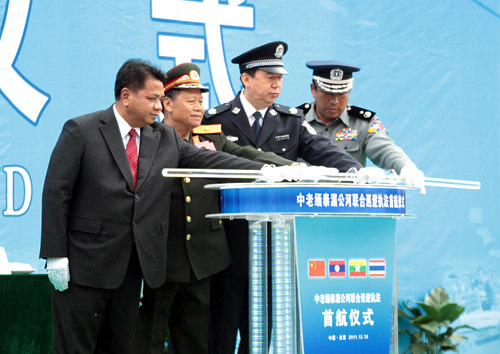|
 |
|
JOINT OPERATION: Police officers from China, Laos, Myanmar and Thailand take part in the launching ceremony of the joint patrol along the Mekong River in Guanlei Port in Yunnan Province on December 10. The joint patrol restores shipping services on the Mekong River, which were suspended since attacks on Chinese ships in October (WANG XIAOXUE) |
Regulating School Buses
The Legislative Affairs Office of the State Council, China's cabinet, issued a draft regulation on school bus safety management on December 11 and asked for public feedback.
The draft stipulates that local governments above the county level should take "overall responsibility" for school bus safety.
The government will establish and regularly update a system of mandatory technical standards for the quality of vehicles used as school buses.
China issued a set of technical standards for school buses for primary school students last year, and the drafting of another standard for buses used in kindergartners is also underway.
According to the draft, the government will adopt a license system for school bus operation.
Measuring Emissions
China plans to develop its own new comprehensive system for monitoring and accurately calculating the country's greenhouse gas (GHG) emissions, said a leading Chinese scientist.
Ding Zhongli, Vice President of the Chinese Academy of Sciences (CAS), said that the new system would help the country keep track of exactly how much GHG it emits, knowledge that will serve as the basis for China's carbon emission reduction efforts.
Researchers will compile GHG emission lists for the quantitative evaluation of carbon dioxide emissions generated through both natural process and human activities, as part of an ongoing research program led by the CAS.
The list will cover major human activities that cause emissions such as energy generation, cement production, land use and livestock farming, said Ding.
Submarine Success
Sixteen submarine hydrothermal deposits were discovered during China's largest global ocean expedition, researchers said. The deposits of metals and minerals occur in the deep ocean when water is heated by magma through fissures in the earths crust.
The 369-day expedition, the country's 22nd, was conducted by the expedition vessel, Ocean No.1, which traversed the Indian, Atlantic, and Pacific oceans between December 8, 2010 and December 11.
Tao Chunhui, chief scientist of the expedition team, said that five of the 16 submarine hydrothermal deposits were discovered in the south of the Atlantic Ocean, and the other 11 in the east Pacific Ocean.
China has discovered 33 submarine hydrothermal deposits in the three oceans since the 19th expedition in 2007. These discoveries account for one in 10 of the hydrothermal deposits discovered during the last three decades.
Record Maker
A medicinal botanic garden in southwest China's Guangxi Zhuang Autonomous Region has been confirmed by Guinness World Records to contain the most varieties of medicinal plants and the largest cultivated area of medicinal plants in the world.
The garden covers 202 hectares and is home to more than 6,000 species of living medicinal plants (including more than 100 endangered varieties and over 30 new varieties), over 3,200 kinds of medicinal plant seeds and 100,000 images of medicinal plants.
Guangxi's health authorities built the garden in 1959, aiming to cultivate, collect and save medicinal plants and also conduct research. | 